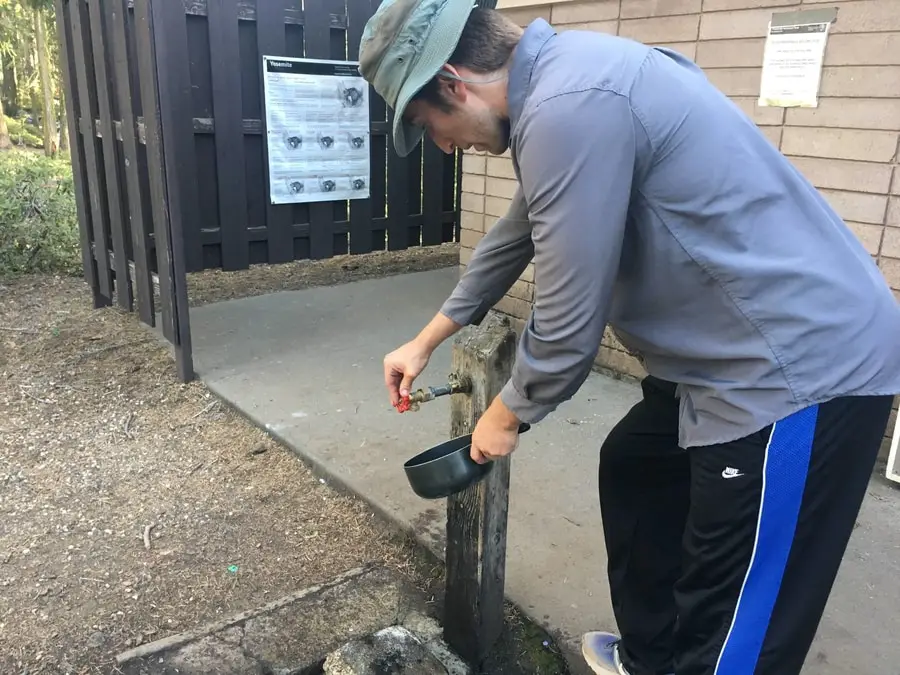
Leaving no trace has always been touted as the right thing to do, it is only more recently that it has been promoted and more people are aware of taking the right actions to minimize our impact on the natural environment. Leaving no trace, except footprints and taking only pictures is important to do while we are camping. We want to preserve the nature and experience for many more generations to come.
One question you might have about proper waste disposal is about dishwater. I too have wondered “where do you dump dishwater when camping?” I wanted to make sure that I did not have a huge negative impact on the environment where I was camping, and hopefully, you want to know too. So I did some research on the best ways to dump dishwater when camping and put it all together here.
So, where do you dump dishwater when camping? When camping you should dump dishwater in a spread out area at least 200 feet from any water source after straining the food particles out of the dishwater.
The first thing you should know is where not to dump your dishwater, it is just as important as where you should be dumping it. It can also be helpful to know how you can reduce your dishwater production and thus have less dishwater that you need to dispose of when camping. After that, we can go over the right way to dispose of dishwater when camping. There are also some other quick tips to add that can further reduce the environmental impact and improve your camping experience.
By the way, If you are in the market for a new camping stove, then you should click here to see the one I recommend on Amazon.
Where you shouldn’t dump your dishwater when camping
The reason why we want to know where to dump our dishwater when camping is to minimize our environmental impact. This is popularly known as following “leave no trace ” principles. While there are nearly unlimited possibilities and answers to where you shouldn’t be dumping your dishwater, here are a few common ones where people have been known to dump their dishwater when they really shouldn’t have.
” principles. While there are nearly unlimited possibilities and answers to where you shouldn’t be dumping your dishwater, here are a few common ones where people have been known to dump their dishwater when they really shouldn’t have.
In or near a natural water source
This is one of the worst places you could dump your dishwater. Lakes, rivers, streams, etc. contain complex ecosystems and species that could be hurt by what is in your dishwater. Our soaps and food scraps can be harmful to them, even if you think it is a small impact, it’s not. Please do not dump dishwater in or around natural water sources. In fact, you should dump dishwater at least 200 feet from any natural water source.
At the campground water spigot
Developed campgrounds often have water spigots that supply potable/unpotable water. Many have signs posted that warn against washing your dishes there. Even if the sign is not directly posted, most campgrounds do have that rule somewhere. The reason being is that the spigots do not have proper drains and proper runoffs. They were not build to handle washing dishes and all the food scraps that come along with it.
Additionally, the water could be very limited and it could be very wasteful to wash your dishes there. Not to mention the animals that will be attracted to the area after the food scraps. It could be harmful to the animals to ingest our food scraps, especially since they are mixed with soap. Please don’t wash dishes at the water spigot in the campground.
In the bathroom sink/toilet
The sinks and toilets in campground bathrooms don’t have the best plumbing usually. Typically they are septic and dumping dishwater with food scraps could cause them to become clogged and unusable. Do everyone a favor and just don’t dump dishwater in the bathroom sink or toilet.
How to reduce the amount of dishwater produced
It also helps to have less dishwater when you go to dump it. If you are going to be dumping it at the campground or in the wilderness, then there is going to be some kind of trace or impact, but our goal is to limit it as much as possible. Reducing our output of dirty dishwater could help reduce our impact significantly. There are plenty of options for doing that, here are a common few;
Use paper plates and plastic dinnerware
These items can be put into trashcans if they are available or easily packed out when you leave. No dishes to wash, no dishwater to dispose of. I can’t comment on if their own longterm environmental impact makes them better off than producing dirty dishwater, but for the area, you are camping in it certainly would help you leave less trace since you can pack them out in the trash.
Put plastic wrap over your plates
Using plastic wrap or something similar over your plates will mean that you won’t have to wash them since the food residue will be on the plastic sheet and not on the plates themselves. Might not work with extremely hot foods, you have been warned.
Use a damp washcloth
Some items just don’t need to be completely washed as others do, if you have a dish that is not really that dirty and just needs a little wipe down then don’t be shy. You are camping, after all, not everything is going to be 99.9% germ-free. Just use less water when washing dishes because only certain parts really get “dirty” in the first place. Some things can even wait until you get home, that way you won’t make any dirty dishwater.
Where and how to properly dump dishwater when camping
Finally, we get to the good part, I did expressly mention how to do it in the introduction but I want to expand on it with more details here. One of the most important components of proper disposal of dishwater when camping is to first strain the food particles from the water itself. There are plenty of creative ways to do this, but the easiest and most practical is to simply use a food strainer. Separate the food particles from the water with a strainer and put the food particles in a trash bag to pack out with you.
Now with the strained water, you are going to want to dump it out over a wide area to allow it to evaporate better. Be sure that you dump it at least 200 feet from a natural water source and if possible in direct sunlight so that the warmth will cause it to evaporate quicker. The wider the area you dump it, the better. Using this method of dishwater disposal causes the least impact when dumping it. However, the best thing you could do in retrospect is to pack out the dishwater if at all possible and then dispose of it at home.
Other things to keep in mind about dishwater
Here are some other things that can be important to keep in mind when washing your dishes while camping and disposing of the dishwater:
- Dishwater is generally known as “gray water” when camping, especially among RV’ers
- Please use biodegradable soap to help lessen the impact on the environment.
- Soap and food residue can make animals sick, so it is essential to strain out the dishwater as much as possible.
- Burying your dishwater is not recommended because animals can burrow and get to it and get sick, it also takes a lot longer for a high concentration of the water to dissipate.
Conclusion
First, strain your dishwater to remove food particles. Second, dump it at least 200 feet away from a natural water source. Third, Spread it out over a wide area in direct sunlight. Do not dump your dishwater in a natural water source, near the campground water spigot, or in the campground bathroom.
Learn to reduce your dishwater output in order to make the whole process much easier. Following these steps will allow you to minimize your impact when dumping dishwater when camping and ultimately protect the environment and maintain a good camping experience for all who come after you.
My Favorite Camping Gear
- Air Mattress: click here
 to check out my favorite on Amazon.
to check out my favorite on Amazon. - Tent: click here
 to see my favorite tent available on Amazon.
to see my favorite tent available on Amazon. - Sleeping Pad: click here
 to check out the one I love on Amazon.
to check out the one I love on Amazon. - Sleeping Bag: click here
 to see the one I recommend on Amazon.
to see the one I recommend on Amazon. - Camping Stove: click here
 to see the best camping stove on Amazon.
to see the best camping stove on Amazon.


